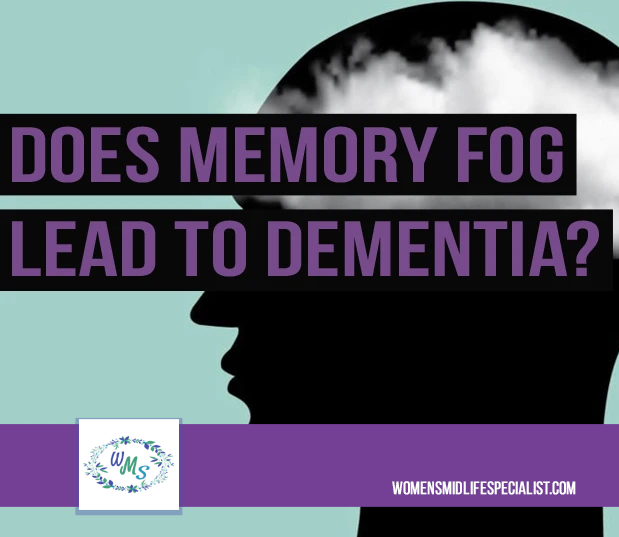Does Brain Fog Lead to Dementia?

Brain fog involves memory problems, a lack of mental clarity, and an inability to focus.
Some fibromyalgia patients become concerned that ‘brain fog’ might be an early symptom of a process leading to Alzheimer’s disease, the most common type of dementia today. Most cases of brain fog are not linked to dementia. There are numerous causes of brain fog. It can be a symptom of a nutrient deficiency, sleep disorder, bacterial overgrowth from overconsumption of sugar, depression, or even a thyroid condition.
Other common brain fog causes include eating too much and too often, inactivity, not getting enough sleep, chronic stress, and a poor diet, poor nutritional habits, mental health issues, stress, depression, endocrine changes, lack of exercise and dehydration. Brain fog is often described as mental fatigue. Depending on how severe it is, it can impact your performance. The good news is that brain fog is not permanent. By taking the right steps, you can reverse the symptoms to find a clear mind.
Here are 3 Causes that may be Contributing to Your Memory Fog
Diet Deficiencies
Vitamin B12 contributes to the formation of red blood cells and the maintenance of your central nervous system. It’s why a deficiency in B12 is sure to impair your energy levels and elicit an overall feeling of fatigue. A vitamin D deficiency can also be behind brain fog as decreased vitamin D levels are associated with impaired cognitive function.
Food Sensitivities
An unidentified food intolerance can also contribute to the foggy feeling you’re experiencing. For example, gluten intolerance can lead to cognitive dysfunction via inflammatory pathways. Advanced blood work that looks at your nutrient levels as well as an elimination diet or food allergy or sensitivity testing can determine if any of these could be contributing to your brain fog.
Digestive Health
Give your Digestive System a Rest Intermittent fasting is all the rage in the nutrition and weight loss world. But it’s not just beneficial for dropping pounds, calorie restriction and longer periods between meals can also promote neurological health and decrease neurodegenerative diseases. Start with trying to extend the time between the last meal of the day and the first meal of the next day. Shoot for 12 hours.
Here are 3 things you can starting doing today to improve memory and avoid “brain fog” and forgetfulness....
1) Get Your Sleep
Sleep loss contributes to mood disturbances and depression.
Try these tips to maintain a healthy sleep cycle:
- Maintain a regular sleep schedule, including on the weekends.
- Reduce your caffeine intake.
- Keep your bedroom cool, and consider placing a fan nearby.
- Purchase a cooling pad or pillows with cooling elements.
- Make sure your room is as dark as possible.
- Learn relaxation techniques, such as mindful meditation or yoga.
- Exercise, but not right before bedtime.
- Wear bedclothes made of natural fibers, such as cotton, hemp, linen, or silk.
- Avoid alcohol, smoking, and spicy foods.
- Eat a diet that’s rich in fruit and vegetables, particularly leafy green vegetables.
- Look for whole-grain products in breads and side dishes.
- Choose low-fat dairy options.
- Eat eggs to get the protein and vitamin D you need for bone health.
- Use unhydrogenated oils, such as olive oil, safflower oil, or canola oil.
- Choose products made with unhydrogenated oil if you’re purchasing processed food.
- Limit sweets, especially baked goods and carbonated beverages.
- Limit red meat.
2) Eat right Food that’s bad for your heart may also be bad for your brain. This means that you should limit saturated fats and trans fats found in foods such as fried foods, battered foods, and baked goods. Try these other tips for eating a healthful diet, as well:
3) Exercise your brain Keeping your brain active helps stave off the effects of aging. Try these tips to give your brain a workout.
- Do crossword puzzles and Sudoku.
- Play word games.
- Play online brain games and quizzes.
- Read books, newspapers, and magazines.
- Learn something new, like a musical instrument or a new language.
- Spend time talking and socializing with family or friends.
While fatigue, brain fog, and other menopause symptoms are troublesome, the good news is that they will usually improve over time. Research shows that the intellectual edge lost during the period leading up to a woman’s last menstrual cycle does rebound in the later phases of menopause. Hormone replacement therapy (HRT), or estrogen and progesterone can also help women better manage brain fog and fatigue. Estrogen has been shown to improve mood, increase concentration, reasoning and memory.
And estrogen also helps us be more creative. WMS mean really, is that any secret to you? Not to me. How else do you think we can wear so many hats and take care of so many things at the same time? Estrogen also helps increase acetylcholine in the brain - which is the brain neurotransmitter that helps us focus and think more quickly. And did you know that the main prescription medication we use to help slow down the progression of Alzheimer’s Disease, called Aricept, simply works by increasing this same neurotransmitter - acetylcholine?


Leave a comment